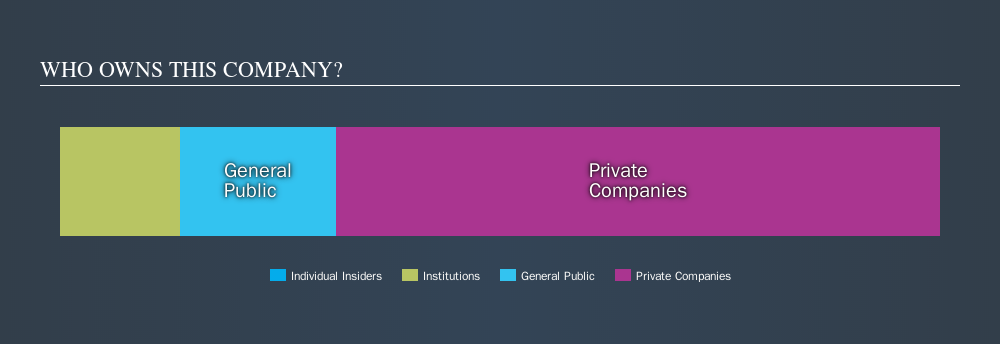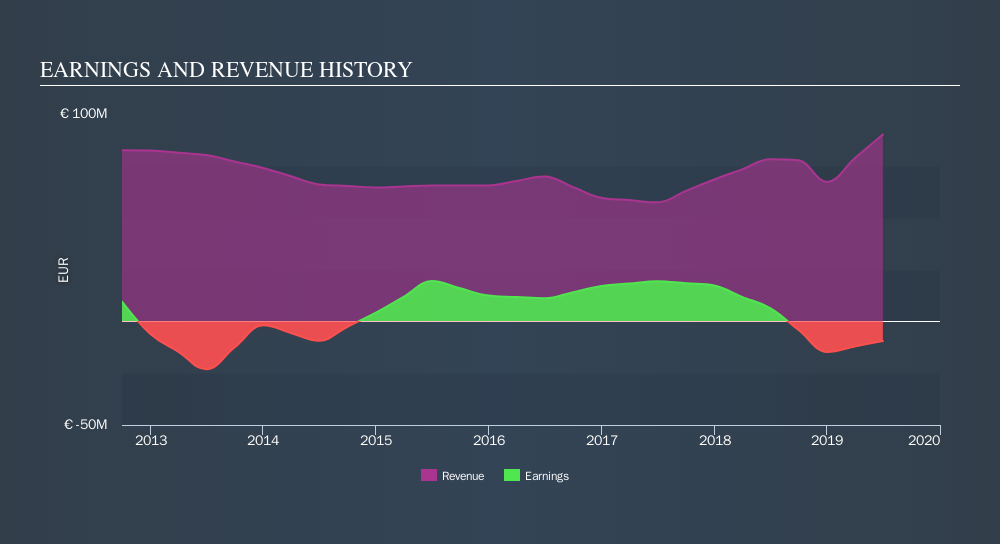- France
- /
- Office REITs
- /
- ENXTPA:EIFF
Can We See Significant Institutional Ownership On The Société de la Tour Eiffel (EPA:EIFF) Share Register?

A look at the shareholders of Société de la Tour Eiffel (EPA:EIFF) can tell us which group is most powerful. Institutions often own shares in more established companies, while it's not unusual to see insiders own a fair bit of smaller companies. Companies that have been privatized tend to have low insider ownership.
Société de la Tour Eiffel is a smaller company with a market capitalization of €594m, so it may still be flying under the radar of many institutional investors. In the chart below below, we can see that institutions own shares in the company. Let's delve deeper into each type of owner, to discover more about EIFF.
Check out our latest analysis for Société de la Tour Eiffel

What Does The Institutional Ownership Tell Us About Société de la Tour Eiffel?
Many institutions measure their performance against an index that approximates the local market. So they usually pay more attention to companies that are included in major indices.
We can see that Société de la Tour Eiffel does have institutional investors; and they hold 14% of the stock. This suggests some credibility amongst professional investors. But we can't rely on that fact alone, since institutions make bad investments sometimes, just like everyone does. When multiple institutions own a stock, there's always a risk that they are in a 'crowded trade'. When such a trade goes wrong, multiple parties may compete to sell stock fast. This risk is higher in a company without a history of growth. You can see Société de la Tour Eiffel's historic earnings and revenue, below, but keep in mind there's always more to the story.

Société de la Tour Eiffel is not owned by hedge funds. As far I can tell there isn't analyst coverage of the company, so it is probably flying under the radar.
Insider Ownership Of Société de la Tour Eiffel
The definition of an insider can differ slightly between different countries, but members of the board of directors always count. Company management run the business, but the CEO will answer to the board, even if he or she is a member of it.
I generally consider insider ownership to be a good thing. However, on some occasions it makes it more difficult for other shareholders to hold the board accountable for decisions.
Our most recent data indicates that insiders own less than 1% of Société de la Tour Eiffel. We do note, however, it is possible insiders have an indirect interest through a private company or other corporate structure. It has a market capitalization of just €594m, and the board has only €302k worth of shares in their own names. Many investors in smaller companies prefer to see the board more heavily invested. You can click here to see if those insiders have been buying or selling.
General Public Ownership
With a 18% ownership, the general public have some degree of sway over EIFF. This size of ownership, while considerable, may not be enough to change company policy if the decision is not in sync with other large shareholders.
Private Company Ownership
We can see that Private Companies own 69%, of the shares on issue. It might be worth looking deeper into this. If related parties, such as insiders, have an interest in one of these private companies, that should be disclosed in the annual report. Private companies may also have a strategic interest in the company.
Next Steps:
While it is well worth considering the different groups that own a company, there are other factors that are even more important.
I like to dive deeper into how a company has performed in the past. You can access this interactive graph of past earnings, revenue and cash flow for free.
Of course this may not be the best stock to buy. So take a peek at this free free list of interesting companies.
NB: Figures in this article are calculated using data from the last twelve months, which refer to the 12-month period ending on the last date of the month the financial statement is dated. This may not be consistent with full year annual report figures.
We aim to bring you long-term focused research analysis driven by fundamental data. Note that our analysis may not factor in the latest price-sensitive company announcements or qualitative material.
If you spot an error that warrants correction, please contact the editor at editorial-team@simplywallst.com. This article by Simply Wall St is general in nature. It does not constitute a recommendation to buy or sell any stock, and does not take account of your objectives, or your financial situation. Simply Wall St has no position in the stocks mentioned. Thank you for reading.
About ENXTPA:EIFF
Société de la Tour Eiffel
With a property portfolio amounting to €1.6bn, Société de la Tour Eiffel is an integrated property company with a strong culture of services.
Mediocre balance sheet low.
Similar Companies
Market Insights
Community Narratives





